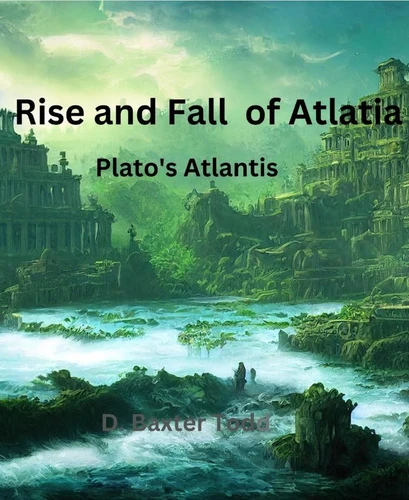The Rise and Fall of Atlatia
Par :Formats :
Disponible dans votre compte client Decitre ou Furet du Nord dès validation de votre commande. Le format ePub est :
- Compatible avec une lecture sur My Vivlio (smartphone, tablette, ordinateur)
- Compatible avec une lecture sur liseuses Vivlio
- Pour les liseuses autres que Vivlio, vous devez utiliser le logiciel Adobe Digital Edition. Non compatible avec la lecture sur les liseuses Kindle, Remarkable et Sony
 , qui est-ce ?
, qui est-ce ?Notre partenaire de plateforme de lecture numérique où vous retrouverez l'ensemble de vos ebooks gratuitement
Pour en savoir plus sur nos ebooks, consultez notre aide en ligne ici
- FormatePub
- ISBN8986636368
- EAN9798986636368
- Date de parution28/02/2023
- Protection num.pas de protection
- Infos supplémentairesepub
- ÉditeurD. Baxter Todd
Résumé
Just as there has been much done to disclaim the African heritage of Khemet (Egypt), there has been much done to obfuscate and disclaim the African heritage of Atlatia (Plato's Atlantis). Plato first introduced Atlantis in the Timaeus, a monologue of Timaeus of Locri, a character who appears as a philosopher and a wealthy aristocrat from the Greek colony of Lokroi Epizephyrio. The primary sources for the Greek (and thereby European and "Western") version and stories of Atlantis are Plato's dialogues (Timaeus and Critias) which claim to quote Solon, an Athenian statesman who visited Khemet (Egypt) between 590 and 580 BC; dialogues which profess Solon translated Egyptian records of Atlantis. Based on the priest's timeline (and Plato's given chronology of 9600 BC), Atlantis is placed in the 10th millennium BC at the beginning of the transition from the Paleolithic to the Neolithic via the interim Mesolithic. Plato did with Atlantis just as Homer did with Troy a few hundred years earlier.
He based his story of Atlantis on a real setting and a prehistoric civilization known to ancient Greeks. Modern scholarship tends to dismiss Timaeus's history, considering him a literary construct by Plato, opining that the legend of Atlantis was almost certainly invented by Plato to promote the political ideal of his masterwork. To deny Atlatia (Plato's Atlantis) is to deny an important and significant part of African pre-history and heritage. Ancient Atlatia (Plato's Atlantis) emerged from a specific amalgamation of peoples in the post Ice Age Sahara;, a core group native to the central Sahara, and a related miscegenated group in the western Sahara.
He based his story of Atlantis on a real setting and a prehistoric civilization known to ancient Greeks. Modern scholarship tends to dismiss Timaeus's history, considering him a literary construct by Plato, opining that the legend of Atlantis was almost certainly invented by Plato to promote the political ideal of his masterwork. To deny Atlatia (Plato's Atlantis) is to deny an important and significant part of African pre-history and heritage. Ancient Atlatia (Plato's Atlantis) emerged from a specific amalgamation of peoples in the post Ice Age Sahara;, a core group native to the central Sahara, and a related miscegenated group in the western Sahara.
Just as there has been much done to disclaim the African heritage of Khemet (Egypt), there has been much done to obfuscate and disclaim the African heritage of Atlatia (Plato's Atlantis). Plato first introduced Atlantis in the Timaeus, a monologue of Timaeus of Locri, a character who appears as a philosopher and a wealthy aristocrat from the Greek colony of Lokroi Epizephyrio. The primary sources for the Greek (and thereby European and "Western") version and stories of Atlantis are Plato's dialogues (Timaeus and Critias) which claim to quote Solon, an Athenian statesman who visited Khemet (Egypt) between 590 and 580 BC; dialogues which profess Solon translated Egyptian records of Atlantis. Based on the priest's timeline (and Plato's given chronology of 9600 BC), Atlantis is placed in the 10th millennium BC at the beginning of the transition from the Paleolithic to the Neolithic via the interim Mesolithic. Plato did with Atlantis just as Homer did with Troy a few hundred years earlier.
He based his story of Atlantis on a real setting and a prehistoric civilization known to ancient Greeks. Modern scholarship tends to dismiss Timaeus's history, considering him a literary construct by Plato, opining that the legend of Atlantis was almost certainly invented by Plato to promote the political ideal of his masterwork. To deny Atlatia (Plato's Atlantis) is to deny an important and significant part of African pre-history and heritage. Ancient Atlatia (Plato's Atlantis) emerged from a specific amalgamation of peoples in the post Ice Age Sahara;, a core group native to the central Sahara, and a related miscegenated group in the western Sahara.
He based his story of Atlantis on a real setting and a prehistoric civilization known to ancient Greeks. Modern scholarship tends to dismiss Timaeus's history, considering him a literary construct by Plato, opining that the legend of Atlantis was almost certainly invented by Plato to promote the political ideal of his masterwork. To deny Atlatia (Plato's Atlantis) is to deny an important and significant part of African pre-history and heritage. Ancient Atlatia (Plato's Atlantis) emerged from a specific amalgamation of peoples in the post Ice Age Sahara;, a core group native to the central Sahara, and a related miscegenated group in the western Sahara.






